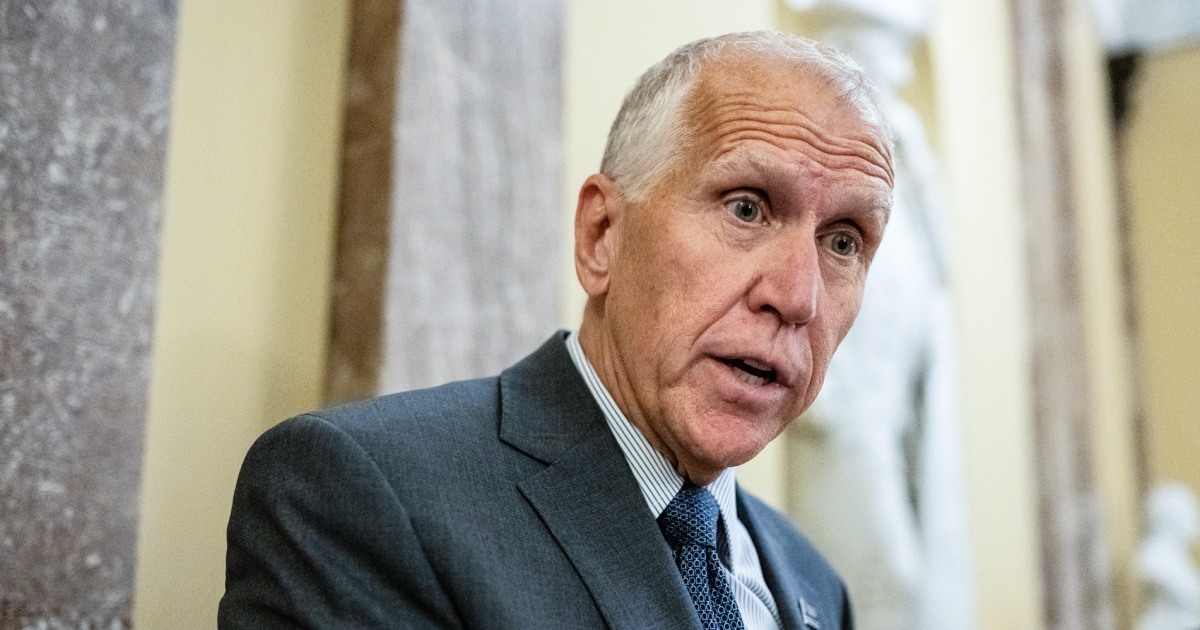GOP Senator's Decision Not to Seek Re-Election Raises Questions for Party Unity and Trump's Agenda

Introduction
In a surprising announcement, GOP Senator Thom Tillis from North Carolina has declared that he will not be running for re-election. This comes just one day after he opposed a major bill for President Donald Trump's agenda. The decision has left many wondering about the implications for the Republican party and the upcoming elections.
Background
Tillis' decision to not seek re-election has caused a stir within the GOP. It has also raised questions about the party's unity and the direction of Trump's agenda. This is not the first time a GOP member has expressed their opposition to the President's policies. Just last month, House Republicans were divided on passing a tax and immigration bill, causing tension within the party.
Furthermore, Tillis' announcement is just one of many instances where Republican politicians have struggled to defend Trump's agenda. Just recently, Senator Joni Ernst made headlines for her flippant remark about the potential consequences of the President's policies, saying "well, we all are going to die." This highlights the difficulty in justifying and defending such major changes to the American economy.
Current Scenario
The GOP's tax and spending cuts package, which has been a major focus for the Trump administration, is now facing even more obstacles. With Tillis' decision to not run for re-election, there is a potential for further divisions within the party. This could potentially delay the passing of the bill, which the President has been pushing to have on his desk by July 4.
In addition to the internal tensions within the GOP, the tax bill has also faced criticism for its proposed regulations on gun silencers and certain types of rifles and shotguns. This has raised concerns for many and has added to the already complicated process of passing the bill.
Conclusion
Tillis' decision not to run for re-election has brought to light the challenges the GOP is facing in pushing through Trump's agenda. With divisions within the party and controversial elements within the proposed tax bill, it remains to be seen how the upcoming elections will be impacted. As the Trump administration continues to push for major changes, it is clear that unity within the GOP will be crucial in achieving their goals.
About the People Mentioned
Thom Tillis
Thomas Roland Tillis, known as Thom Tillis, is an American politician serving as the U.S. Senator for North Carolina. Born on August 30, 1960, in Jacksonville, Florida, Tillis grew up in a working-class family and faced financial challenges early in life. After high school, he worked as a warehouse records clerk before pursuing higher education, earning a bachelor's degree from the University of Maryland University College in 1997[1][2]. Tillis built a successful career in the private sector, working as an executive at IBM and a partner at PricewaterhouseCoopers. His 29-year tenure in technology and management consulting provided him with a deep understanding of policy-making and organizational management[2][4]. He transitioned into public service, serving as a member of the Cornelius Board of Commissioners and later as the PTA president at Hopewell High School. In 2006, he was elected to the North Carolina House of Representatives, where he served as Speaker from 2011 to 2014[2][3]. Tillis was first elected to the U.S. Senate in 2014 and re-elected in 2020. He is a member of several key Senate committees, including Finance, Veterans’ Affairs, and Judiciary[3][5]. As Senator, Tillis has focused on pragmatic policy solutions and job creation. Recently, he has been involved in sponsoring legislation such as the National Park System Long-Term Lease Investment Act[5]. Tillis resides in Huntersville, North Carolina, with his wife Susan, and they have two grown children[2][3].
Donald Trump
Donald John Trump, born June 14, 1946, in Queens, New York, is an American businessman, media personality, and politician. He graduated from the University of Pennsylvania’s Wharton School in 1968 with a degree in economics. In 1971, he took over his family’s real estate business, renaming it the Trump Organization, through which he expanded into building and managing skyscrapers, hotels, casinos, and golf courses. Trump gained widespread fame as the host of the reality TV show *The Apprentice* from 2004 to 2015, which helped establish his public persona as a successful entrepreneur. Trump entered politics as a Republican and was elected the 45th president of the United States, serving from 2017 to 2021. His presidency was marked by significant policy actions including tax cuts, deregulation, the appointment of three Supreme Court justices, renegotiation of trade agreements (notably replacing NAFTA with the USMCA), and a focus on immigration control including border wall expansion. He withdrew the U.S. from international agreements such as the Paris Climate Accord and the Iran nuclear deal, and engaged in a trade war with China. His administration’s response to the COVID-19 pandemic was criticized for downplaying the virus’s severity. Trump was impeached twice by the House of Representatives—first in 2019 for abuse of power and obstruction, and again in 2021 for incitement of insurrection—but was acquitted by the Senate both times. After losing the 2020 election to Joe Biden, Trump challenged the results, culminating in the January 6, 2021, Capitol riot. He remains a central figure in American politics, having won the 2024 presidential election and returned as the 47th president in 2025, continuing to promote policies aimed at economic growth, border security, and military strength[1][2][3][4].
Joni Ernst
Joni Ernst is a Republican U.S. Senator from Iowa, serving since January 2015. Born on July 1, 1970, in Red Oak, Iowa, she grew up on a family farm and later graduated from Iowa State University and earned a master’s degree from Columbus State College. Ernst served over 20 years in the U.S. Army Reserves and Iowa Army National Guard, including deployment as a company commander during Operation Iraqi Freedom. Before the Senate, she was Montgomery County auditor (2005–2011) and then served in the Iowa State Senate from 2011 to 2014[1][2][6][7]. Ernst gained national recognition during her 2014 Senate campaign with a memorable ad emphasizing her farming roots and fiscal conservatism, declaring she knew how to “cut pork” in Washington. She became the first woman to represent Iowa in the U.S. Senate and the first female combat veteran elected to the Senate. Her political positions are firmly conservative, advocating for limited federal government, states’ rights, repeal of the Affordable Care Act, and strong support for Iowa farmers and small businesses. She has also opposed abortion and supported gun rights[2][7]. In the Senate, Ernst has been active on committees related to agriculture, veterans’ affairs, and national defense. She delivered the Republican response to President Obama’s 2015 State of the Union address and supported many of President Trump’s policies, including tax reform and attempts to repeal the Affordable Care Act. She voted against Trump’s conviction in his 2020 impeachment trial. Recently, Ernst sponsored legislation focused on food security and farm protection, reflecting ongoing engagement with agricultural issues important to Iowa[1][2][5]. Ernst continues to represent Iowa with emphasis on economic growth, national defense, and veterans’ support. She resides in Red Oak, Iowa.
About the Organizations Mentioned
GOP
The **GOP**, or **Grand Old Party**, is the widely recognized nickname for the **Republican Party** of the United States, a major conservative political party founded in 1854. It originated from anti-slavery activists opposing the Kansas-Nebraska Act, uniting former Whigs and Free Soilers with a platform centered on halting the expansion of slavery. The party's early historic milestone was the election of Abraham Lincoln in 1860, which precipitated the Civil War; under Lincoln’s leadership, the GOP focused on preserving the Union and abolishing slavery[1][2][3]. Throughout its history, the Republican Party has evolved from its abolitionist roots to champion business interests, industrial growth, and economic policies favoring limited government intervention. In the late 19th and early 20th centuries, it promoted protective tariffs and infrastructure development. The party experienced fluctuating influence, losing ground during the New Deal era but regaining prominence with Dwight D. Eisenhower’s presidency in the 1950s, marked by moderate conservatism[1][2]. Today, the GOP advocates for reduced taxes, conservative social policies, limited government regulation, strong national defense, and states’ rights. It remains one of the two dominant forces in American politics, consistently shaping legislative agendas and national discourse[2]. The party is organized and led nationally by the **Republican National Committee (RNC)**, which manages fundraising, election strategies, and the party platform, coordinating efforts across states and counties under the leadership of a chairman[3][4]. Notably, the acronym "GOP" was popularized in the late 19th century and originally stood for "Grand Old Party," symbolizing the party's legacy in preserving the Union and championing liberty. It is now a common term in political commentary and media[3][5]. In recent years, the GOP has undergone significant membership changes in Congress and leadership adjustments, reflecting its dynamic role in U.S. politics as
House Republicans
The **House Republicans** refer to the Republican caucus within the United States House of Representatives, currently holding a slim majority in the 119th Congress beginning in 2025. This group functions as the primary organizational body for Republican members in the House, coordinating legislative strategy, party messaging, and leadership elections[4][9]. Historically, the House Republican Conference has been a major force shaping U.S. policy and governance since the party’s founding in the mid-19th century. It provides a platform for collective decision-making and policy development among Republicans in the House. The Speaker of the House, currently Mike Johnson (LA), is the most senior Republican leader and presides over House proceedings, sets the legislative agenda, and serves as the party’s chief spokesperson[2][4]. The Majority Leader (Steve Scalise), Majority Whip (Tom Emmer), and other leadership roles manage daily legislative operations, party discipline, and coordinate votes[4][5]. In terms of **key achievements**, House Republicans have historically influenced major legislation on taxation, deregulation, defense, and judicial appointments. Their agenda in 2025 focuses on reversing policies from the previous administration, emphasizing conservative priorities such as economic growth, national security, and limiting government intervention[7][6]. The current status of the House Republican majority is notably narrow, with just 219 seats out of 435, the smallest margin since 1931. This slim majority demands strong party unity and strategic negotiation to pass legislation and maintain control. Speaker Johnson’s election required every Republican vote except one, illustrating the fragile balance within the caucus[1][3][6]. The party’s leadership includes new and returning figures tasked with navigating this delicate legislative environment while working closely with the executive branch under President Donald Trump’s administration[5][7]. Notable aspects of the House Republicans include their tight internal cohesion, strategic focus on legislative priorities aligned with conservative principles, and their adaptation to a highly divided House, which impacts how they engage



















